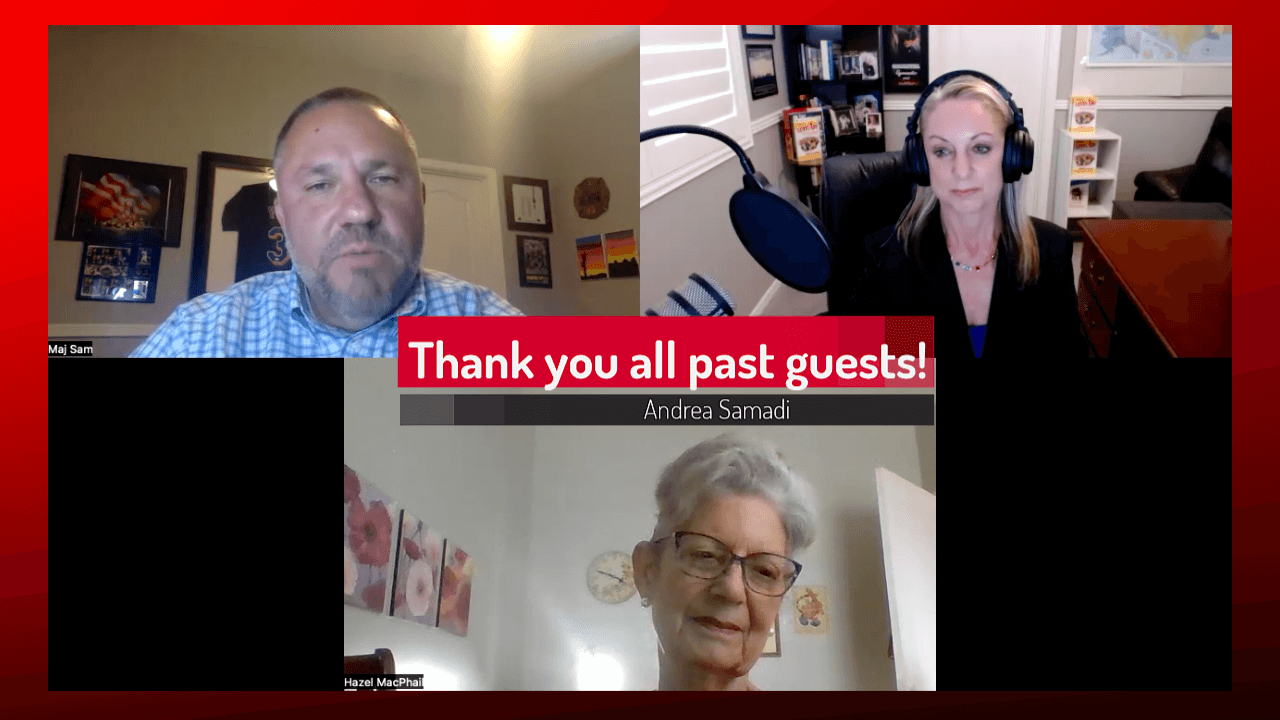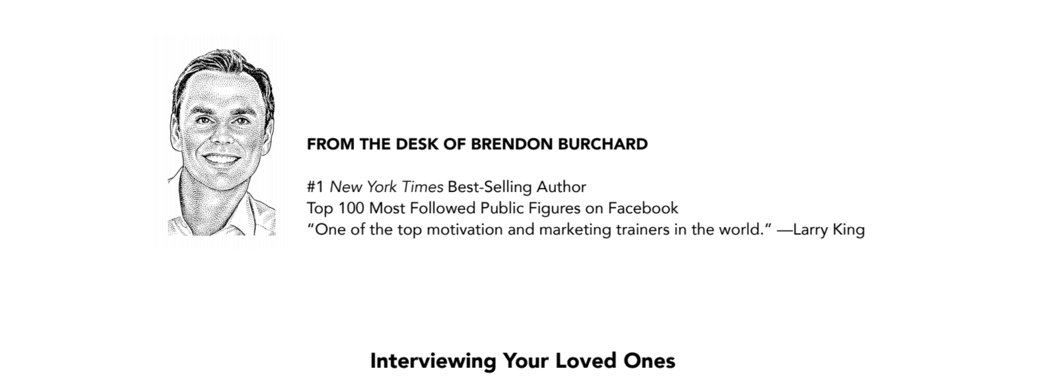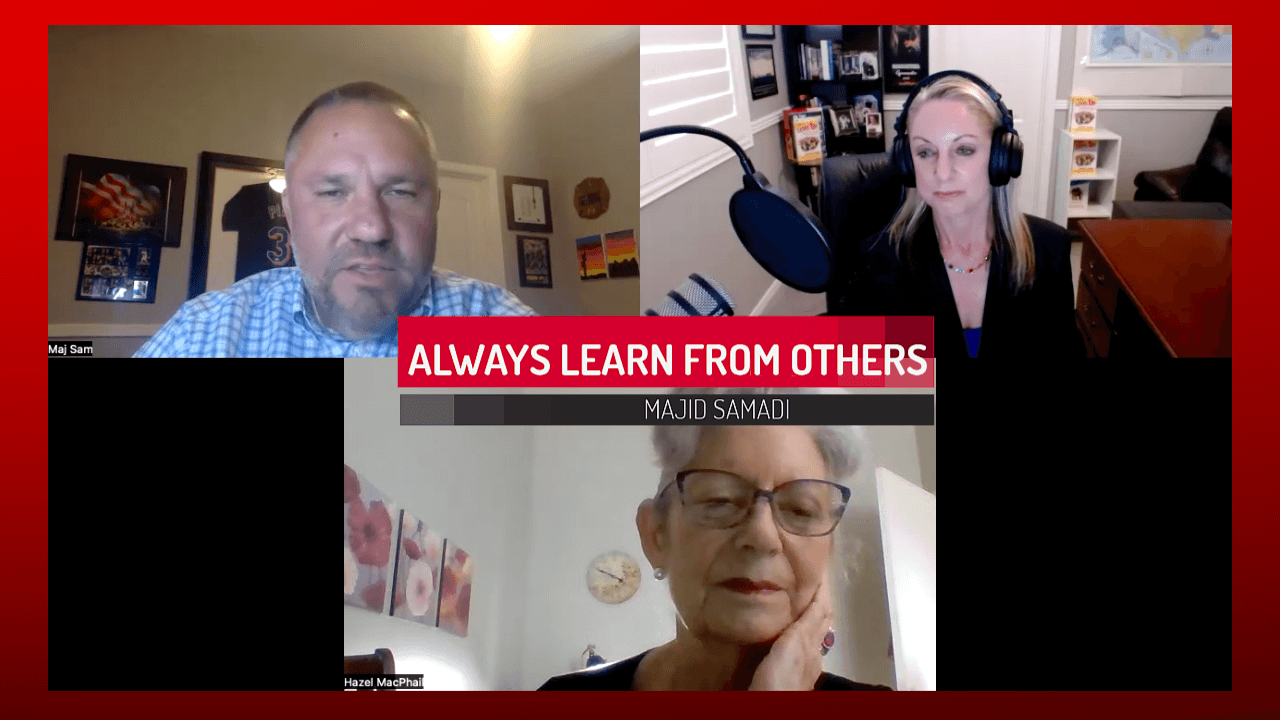“Honoring our loved ones means respecting and appreciating them, learning about them, and perpetuating their stories and life lessons after they are gone.” New York Times Best Selling Author, Brendon Burchard.
Happy 80th Birthday Mom and THANK YOU to ALL past guests.
Watch this interview on YouTube here https://youtu.be/dzZZSHAyKFs
On Today's MILESTONE EPISODE #300 we will cover:
✔ 12 Life Lessons from my Mom, Hazel MacPhail for "How to Live the Good Life" Inspired by Brendon Burchard
✔ Life Lesson tips from Majid Samadi
✔ How Majid and Hazel both moved to a new country, and rose from the bottom of their field, to the top.
✔ Success and Mindset Strategies they both used.
✔ Honoring those who have influenced us to rise to greater heights in our life.

Welcome back to The Neuroscience Meets Social and Emotional Learning Podcast, where we connect the science-based evidence behind social and emotional learning (that’s finally being taught in our schools today) and emotional intelligence training (used in our modern workplaces) for improved well-being, achievement, productivity and results—using what I saw as the missing link (since we weren’t taught this when we were growing up in school), the application of practical neuroscience. I’m Andrea Samadi, an author, and an educator with a passion for learning and launched this podcast 5 years ago with the goal of bringing ALL the leading experts together (in one place) to uncover the most current research that would back up how the brain learns best, taking us ALL to new, and often unimaginable heights.
For today’s episode, #300, I wanted to do something special, something magical for this important milestone, and I knew what it would be a few months ago. Listeners who tune into this podcast might know that I bring guests on to help ALL of us to learn and apply the most current research to help us to improve our productivity and results, but there’s a lot more to it than that.
I heard author and speaker Brendon Burchard explain this concept in 2014 when I first began interviewing experts, and his thoughts changed me deeply. In his YouTube video Interview Those You Love, Before They Are Gone[i] he asks “how do you honor people who are important to you?” You know, the people who have taught you something that changed you in a positive way? Some people send gifts to these people, but not Brendon. He made a pact to do something unique to honor these change-makers and when I heard what he did, I thought “I want to do exactly the same thing as Brendon Burchard.” After all, he is the author of the book High Performance Habits: How Extraordinary People Became That Way[ii]. He suggested that a special way to honor someone who has made a difference in your life is to interview them, and ask for their words of wisdom, that will be recorded for you, and others to hear, forever.
That’s exactly what I have done with this podcast, starting with my husband, Majid Samadi, who influences me daily, and then if you look through the guests I’ve asked to come on the podcast, you will now know they were all intentional for me to honor the difference they made with my work, character, the direction and understanding in this thing we call life, and how to live “the good life.” Brendon suggests that instead of sending them a gift, the best way to honor these people in your life is to first of all tell them directly the difference they’ve made for you, how specifically they have helped you, and then carry their voice forward, in yours, with an interview. I know that each person I’ve interviewed has a clear picture of how they helped me specifically, and now their message helps others, all around the world. I’ve got to say that sometimes the messages you’ll receive from other to improve yourself aren’t easy to hear, but if they are delivered with love, with your growth in mind, listening to this feedback can make a profound difference in your life.
I’ll never forget the interview I did with best-selling author John Assaraf, from EP #39[iii] (that was actually recorded in 2015) because it was John who gave me feedback on the program I created, that was going into schools, (not in this interview) but he told me directly, face to face, that I had to redo everything, and he used the exact words that I clearly have never forgotten, “your baby (which was my membership site at the time) is ugly” and he said, you can’t charge people money for this. I remember thinking “well, shoot, if I had millions of dollars in my bank like you I wouldn’t have had to code the whole website on my own” but I put my defensive mind aside, and redid the site, before selling it to anyone. And then when my programs went into the schools, I had more feedback, and an uncomfortable meeting with educator Jeff Kleck[iv], who told me all the parts of my work that he recommended I change, replacing the old, with the most current brain research (that at the time, I knew nothing about). I didn’t like hearing this feedback at all, and it was a lot of hard work to fix both the membership site with John’s feedback and write a whole new book, with Jeff Klecks’s, but I’m so grateful for everyone who gave me advice to improve personally and professionally.
I’m sure you can think of those who have done this for you. Imagine if we all reached out to those who impacted us this way, let them know how they helped us, and then glean some wisdom from them to help others? Imagine a world like this?
That’s what I’ve done since 2019 with this podcast. I’ve been very intentional about WHO I’ve asked as a guest, and today’s guest is someone very special in my life, who is responsible for the person I am today, literally. Today’s guest is my Mom, Hazel MacPhail. My Mom will join my husband, Majid Samadi and I for a conversation that I hope will bring some insight to you, wherever you tune in around the world. My Mom was born August 10th 1943 in Haslemere, Surrey, England and named Hazel Frances Bernhardt. She married my Dad, Francis (Frank) Greenshields MacPhail in the sixties and emigrated to Canada with him and my two sisters Karen, and Christine in 1973.
She met my Dad in The Carioca Club, that she said was a coffee bar hang out for young people on the seafront at Worthing Sussex, her Mom’s home town and where she spent to first 10 years of her life before moving to Goring in Sussex, a few miles away. I was 2 when my parents emigrated to Toronto, Canada, where I grew up, before moving to the United States in early 2001. My Mom will answer the questions I’ve picked out for her from a unique perspective of someone who had to start her life over from scratch, in a new country, and Majid will bring his experience of moving to the United States from Iran when he was 10.
I’m hoping you will find their insight and ideas from my Mom on “How to Live The Good Life” to be empowering, inspiring and useful, as they will both share their legacy stories from the point of view of someone who had to build something out of nothing.
Let’s meet my Mom, Hazel MacPhail and welcome Majid Samadi back for his 4th time on the podcast and I’m going to ask them some of the questions that New York Times Best-Selling Author, Brendon Burchard suggests for Interviewing Someone You Love.

INTERVIEW SOMEONE YOU LOVE ABOUT LIFE
Some Questions by Brendon Burchard
Welcome Hazel and Majid! Thank you for coming on the podcast today. Mom, it’s been a long time since I called you Hazel…maybe over 20 years ago when I was your swimming teacher. Welcome and thanks for being here, and welcome back Majid, for your 4th time on the podcast.
INTRO: Mom, you would know by now that I do these podcasts, and interview people all over the world to glean their wisdom and advice. Today, I wanted to ask you some questions so you can share your words of wisdom with our audience that spans over 190 countries, around the world. Can we start to orient our listeners with both of your backgrounds?
Q1:
Hazel: What comes to mind when you think about growing up in [England-The Quadrant]?
Majid: What comes to mind when you think about growing up in Iran?
Q2:
Hazel and Majid: What made you decide to move to a new country?
Majid: What was it like coming to the US without knowing how to speak the language?
Q3:
Hazel and Majid: How did you choose your career? What did you like the most/least about it?
Q4:
Hazel and Majid: What made you successful at work?
Q5:
Hazel and Majid: What helped you through difficult times?
Q6:
Hazel and Majid: What events most shaped your life?
Q7:
Hazel and Majid: What words best describe who you tried to be in life and how you want to be remembered?
Q8:
Hazel and Majid: What have you learned about other people in life?
Q9:
Hazel and Majid: What are you most proud of in life?
Q10:
Hazel and Majid: Final thoughts?
Mom, and Majid, I want to thank you both for coming on the podcast today, and helping me to share your message with our listeners, and leave a part of your legacy with mine. I can’t tell you enough how grateful I am to have had this opportunity today. I hope your lessons help others, and specifically, I do hope that others follow Brendon Burchard’s lead, and interview those who have impacted them in their lifetime. This has been an incredible experience that I’ll never forget. Thank you.
FINAL THOGHTS:
All episodes are special and important to me, but this one, came full circle from where we began in June 2019. Some things aren’t easy to see looking forward, but so clear when you connect the dots, looking backwards, like Steve Jobs is famous for saying.
When I asked my Mom to come on the podcast and record an episode with my husband, I had no idea that we would record the weekend before my Mom’s 80th Birthday on August 10th, so I knew I had to release this episode on her 80th Birthday, as a thank you for all that she did for me that took me to where I am today.
It was my Mom, Hazel, who sat with me every morning, planning the best way for me to move to the United States, and what I would do when I arrived. She didn’t foresee September 11th happening, or any of the hardships, but she told me many times that it would be hard work, but I would be very happy. I believed her, because over the years I learned to trust her instinct and magical intuition. She would spend hours every night studying for these work tests, in the insurance industry (she said they were the Lomas Tests) and after she had passed all of these tests, I noticed she was still studying at night.
I wondered what she was studying, and knew in my heart it was important work. My Mom worked hard at her craft, but she worked equally as hard at developing the faculties of her mind. If you ask me, this is what gave her an edge over others in her life, helped her through difficult times raising us kids, and especially helped her when she had to overcome Uterine Cancer.
I noticed the hard work she put into this study, and watching her motivated me to do the same. It’s sort of contagious when you see someone else working hard, and yielding the results from this work, and this what I’m doing when I am driven to keep learning, and sharing with you here on the podcast.
I want to carry my Mom’s legacy forward, in my work.
To close out this episode, I’ll review the TOP 12 Life Lessons I picked out from her words today, and hope it helps you in some way.
LESSON 1: Be Clear About the Part of Your Life That Shapes You the Most: She remembered hers, and I know mine. It’s not the easy times that I know changed me, it those difficult challenging times. So if you are IN difficult, and challenging times now, know they will end, and you will be a better person because of them.
LESSON 2: Say “YES” to every job to move your career forward. I talk about this in my most recent book, Level Up[v], in the chapter on Persistence, with the words of the late Art Linkletter, who had no business experience, but created a highly popular TV show back in the 1950s and 1960s called Kids Say the Darndest Things. When I heard him speak years ago, his whole message was about persistence, saying he had to interview 27,000 children to get the ones that were really good that went on television. He also mentioned that his biggest regret in life was saying no to a business opportunity with his good friend Walt Disney, who took him to these orange groves, and tried to paint the picture of Disneyland for him, but he couldn’t see his friends vision. Say “yes” to everything, just like my Mom said, so you don’t miss out on a partnership like Disneyland like Art did.
LESSON 3: Keep Learning New Skills. This is what I watched my Mom doing at night after long days at the office, and what motivates me to keep learning. What is it that keeps YOU coming back and learning from podcasts, or listening to us today?

LESSON 4: Have a sense of humor. This one, I don’t have any tips for, as this is not my strength. Majid is better at this one than me, as I’m usually the more serious one.
LESSON 5: Learn how to solve difficult problems and know where to go when you get stuck with something. This is one of the reasons why I do this podcast, to share tools and resources we can all use to help move us forward.
LESSON 6: Learn to be resourceful. This is something I remember John Assaraf saying in our interview together (EP #39)[vi] that made a difference in his early life. He talked about ways he would think creatively when he didn’t have enough money to do things, and this creativity spilled over into his life today, helping him to see ways forward, around roadblocks.
LESSON 7: ALWAYS LEARN FROM OTHERS. If you keep reading books, listening to ideas, you can learn to do some outstanding things, all from others.
LESSON 8: There’s more good people in the world than bad. See the good in people. We cover this on EP#214[vii] with Marie Gervais and her book “The Spirit of Work.”
LESSON 9: Learn to read people. My Mom taught me Theory of Mind that we covered on EP 46[viii] when I told her I needed help with this skill. We took this a whole bunch of levels deeper with EP#163[ix] with Dan Hill, the faces guy, on his episode that taught us “How to Read the Emotions in Others in Schools, Sports and the Workplace.” This skill, when practiced, will give you information quickly about another person, as our eyes really are the mirrors to our soul.
LESSON 10: Thank people who have moved your forward somehow. That was the whole point of this episode that I mention in the backstory. Find those who have helped YOU along the way, and let them know.
LESSON 11: Learn from our challenging experiences. This one doesn’t need any explanation.
LESSON 12: Finally, the last words of wisdom from my Mom, have no regrets in life.
And with that, I’ll close out our 300th episode, dedicated to Mom, Hazel on her 80th Birthday. Happy Birthday Mom. I love you, and am so grateful to have had this opportunity to record your words of wisdom, for others around the world to hear. I also want to honor the words of wisdom from ALL our past guests today, as we reach this important milestone, and I’ll see you next week!
RESOURCES:
Neuroscience Meets SEL Podcast EP46 “As Close to Mind Reading as Brain Science Gets: Developing and Using Theory of Mind.” https://andreasamadi.podbean.com/e/as-close-to-mind-reading-as-brain-science-gets-developing-and-using-theory-of-mind-in-your-daily-life/
REFERENCES:
[i]Interview Those You Love, Before They Are Gone Brendon Burchard September 27, 2014 https://www.youtube.com/watch?v=mlOAdFFOipE
[ii] High Performance Habits: How Extraordinary People Became That Way by Brendon Burchard Published September 19, 2017 https://www.amazon.com/High-Performance-Habits-Extraordinary-People/dp/1401952852
[iii]Neuroscience Meets SEL Episode #32 with John Assaraf https://andreasamadi.podbean.com/e/john-assaraf-on-brain-training-resourcefulness-and-the-future/
[iv] Neuroscience Meets SEL Episode #246 https://andreasamadi.podbean.com/e/jeff-kleck-on-using-neuroscience-to-inspire-thinkers-in-schools-sport-and-the-workplace/
[v] Level Up by Andrea Samadi Published September 15th, 2014 https://www.amazon.com/Level-Up-Brain-Based-Skyrocket-Achievement-ebook/dp/B078V3L7FT/ref=sr_1_1?crid=NJIK1905GS7P&keywords=level+up+andrea+samadi&qid=1691593337&sprefix=level+up+andrea+samadi%2Caps%2C141&sr=8-1
[vi] Neuroscience Meets SEL Episode #32 with John Assaraf https://andreasamadi.podbean.com/e/john-assaraf-on-brain-training-resourcefulness-and-the-future/
[vii]Neuroscience Meets SEL Podcast EP214 with Marie Gervais on “The Spirit of Work” https://andreasamadi.podbean.com/e/marie-gervais-phd-on-the-spirit-of-work-connecting-science-business-practices-and-sacred-texts-for-a-happier-and-more-productive-workplace/
[viii] Neuroscience Meets SEL Podcast EP46 “As Close to Mind Reading as Brain Science Gets: Developing and Using Theory of Mind.” https://andreasamadi.podbean.com/e/as-close-to-mind-reading-as-brain-science-gets-developing-and-using-theory-of-mind-in-your-daily-life/
[ix] Neuroscience Meets SEL Podcast EP163 with Dan Hill on “How to Read the Emotions in Others in Schools, Sports and the Workplace.”
No comments yet. Be the first to say something!